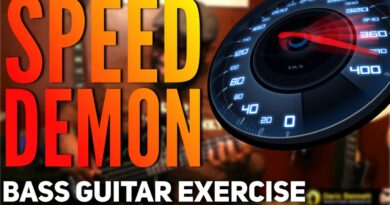Common Beginner Bass Mistakes (And How to Fix Them!)
Are You Ready to Make Next Year Your Best Yet?
As the new year quickly approaches, I have a question for you: Do you truly want to succeed as a musician? Not just “make it big,” but genuinely strive to become a great musician.
The well-known phrase, “If you fail to plan, you plan to fail,” often attributed to Benjamin Franklin, underscores the critical nature of preparation. While its origins are debated, its truth is undeniable. Our brains are goal-seeking machines designed to focus on survival and growth. Achieving specific goals is essential for both.
Now, pause for a moment and re-read that.
New Year’s resolutions often falter because they are plagued by common pitfalls:
1. Lack of Specificity
Vague goals like “get better at music” lack clear steps, making it hard to track progress or stay motivated.
2. All-or-Nothing Mentality
One slip-up can feel like a failure, leading many to give up entirely instead of bouncing back.
3. Neglecting Habit Formation
Lasting change requires consistent effort. Without building habits, old routines quickly resurface.
4. Overcommitting
Taking on too many goals at once dilutes focus and energy, reducing your chances of success.
5. External Pressure
Goals shaped by others’ expectations often lack personal meaning, making them harder to pursue.
6. Lack of Accountability
Without support or systems to track progress, motivation can wane.
7. Drastic Changes
Attempting radical shifts all at once can overwhelm you. Small, sustainable changes are far more effective.
To avoid these pitfalls, it’s essential to set realistic, specific goals broken into smaller, actionable steps. Patience and consistency will take you further than sheer ambition ever could.
A Personal Journey with Goal Setting
Like many, I used to set New Year’s resolutions that failed by the end of January. My mistake? Trying to tackle too much at once without a clear plan. Everything changed when I started setting 1-year, 3-year, and 5-year goals, then breaking them into smaller monthly and weekly milestones. This “chunking down” approach kept me motivated and on track.
Why share this? Because the New Year offers a perfect opportunity to set intentional, achievable goals for your music journey. To help you make next year your best yet, here are four books I highly recommend:

1. 365 Days of Practice by Rick Margitza
This book provides a daily structure for your practice routine, rooted in foundational techniques Rick learned from Gary Campbell at the University of Miami. Each day introduces a small, manageable exercise or concept to improve your playing and boost your confidence.
While some advocate practicing every motif in all keys, I believe it’s often more effective to focus on the original key—after all, Charlie Parker didn’t play Donna Lee in C instead of Ab! However, experimenting with keys that resonate with you is always worthwhile.
[ VIEW ]

2. Bass Foundations by Chuck Israels
Chuck was a guest on our Notes From An Artist radio show/podcast this past March. Drawing from Chuck’s legendary work with Bill Evans, this book dives into rhythm, note choices, key centers, and melody through spot-on transcriptions of his performances.
To get the most out of this book, take time to thoroughly read the instructions, listen to the music via platforms like Spotify or YouTube, and follow along with the transcriptions. As a tip, always analyze a chart’s range(highest and lowest notes) to plan your left-hand placement—this practice will serve you well in every context.
[ VIEW ]

3. Major is Harmonic by Randy Vincent
This book explores the often-overlooked harmonic minor scale, showing how it can expand your musical vocabulary. Randy encourages reexamining traditional scales and embracing fresh sounds that can transform your perspective.
By challenging your usual patterns and introducing new concepts, this book will open your ears and push your creativity in exciting directions.
[ VIEW ]

4. Logic and Critical Thinking by Vincent Herring
Starting with a profound statement—“Logic and critical thinking in jazz improvisation involve maintaining a balance between creativity and defined structure”—this book emphasizes the importance of goal-setting and disciplined practice.
It complements Randy Vincent’s work, diving into scales (pentatonic, diminished, bebop, synthetic), exploring how starting on different chord tones can create unique sounds, and stressing the importance of a diverse“listening diet.”
[ VIEW ]
A Bassist’s Perspective
As a bass player, your role on the bandstand often includes
1. Locking in with the drummer.
2. Articulating the harmony.
3. Adding something special to the performance.
Mastery of scales and chords is critical to executing these roles with confidence.
Final Thoughts
Francis Bacon famously said, “Knowledge is power,” but Tony Robbins’ update—“Knowledge is potential power”—rings truer. Knowledge becomes powerful only when paired with action.
Take these insights and tools into the new year with the commitment to act on them. With focus, determination, and the right resources, this could be your most transformative year yet.
Books also available from Sher Music shermusic.com
Good luck, and here’s to a year of musical growth!



